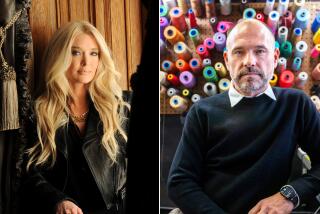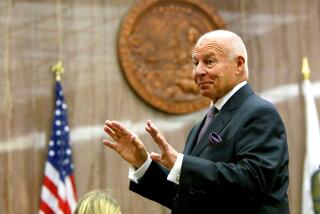Honda Payola Went on for Years, FBI Says : Inquiry: Observers ask how the company could have allowed such a widespread illicit enterprise to continue for so long.
- Share via
Not long after Donald Carlton was picked to open a new Honda dealership in Puyallup, Wash., he traveled to Southern California to personally thank S. James Cardiges, the company’s senior vice president of sales.
How did Carlton show his appreciation? According to the FBI, the men met at a Laguna Niguel hotel bar and Carlton handed a briefcase containing $250,000 to Cardiges, who stashed the cash in the attic of his $770,000 Laguna Hills home.
The alleged bribe is one of many that Cardiges and other former Honda executives are accused of accepting over more than a decade in return for awarding hard-to-get Honda and Acura dealerships.
On Monday, a federal grand jury in Concord, N.H., indicted Cardiges and four others on charges that they illegally pocketed more than $10 million in bribes and kickbacks from car dealers. Philip Israels, Cardiges’ attorney, said Tuesday that his client “will be cleared” in court.
Already, however, eight other former Honda employees have entered guilty pleas to charges related to illegal payments. They are cooperating with investigators in return for leniency in sentencing.
“This had been rumored for some time among dealers,” said Maynard Gordon, the Detroit editor of Dealer Business, a trade magazine. “Payola was known to be par for the course.”
Payment of bribes and kickbacks is not unknown in the auto industry--particularly when demand arises for hot products. Toyota faced a similar scandal about two decades ago, and corruption hit some U.S. auto makers after World War II.
The latest scandal is a black mark for Honda, whose Accord was the best-selling car in America two years ago and whose vehicles and dealerships have had a squeaky-clean reputation for quality and customer service.
In a statement, the company said it was “outraged and saddened” by the criminal activities and allegations. But officials declined to answer specific questions, citing the ongoing federal inquiry.
Today, many are asking how Honda could have allowed such a widespread illicit enterprise to go unchecked for so long. Further, the disclosures come at a time when Honda can least afford damage to its image. Like most other Japanese auto makers, it is losing market share to rebounding U.S. competitors.
A close-knit company known for going its own way, Honda has one of the leanest, lowest-paid staffs in the business. Cardiges earned $143,000 in 1992--perhaps 25% below the industry average, consultants say.
“These guys probably took credit for Honda’s success and decided they were entitled to more compensation,” said C.R. Brown, chief operating officer of Los Alamitos-based Daihatsu America. “And they evidently found an avenue to do that.”
The seeds of the scandal were sown in the early 1980s, when Japanese cars were riding a crest of popularity among baby boomers. The quality of Honda’s Accord family sedan was considered to be so high that many buyers were willing to pay as much as $2,000 above the sticker price.
U.S. trade policies fed the fever. The struggling Big Three auto makers sought trade protection from Japanese imports. In response, the Japanese assented to a voluntary restraint agreement, making buyer competition for the most popular cars even keener.
In that atmosphere, Honda dealerships became extremely valuable, and executives at American Honda Motor Co.’s headquarters in Torrance had the power to award them. That was John Billmyer’s job from 1983 to 1988. The federal indictment charges Billmyer, 64, with conspiring with other Honda officials to accept bribes for granting Honda and Acura dealerships.
The majority of charges revolve around Cardiges, 48, who worked for Honda from 1977 to 1992. According to the indictment and other court filings, Cardiges, whose last post was senior vice president of sales, engaged in numerous illegal activities to enrich himself.
In a court affidavit, FBI special agent William Tidyman described the bribe Carlton allegedly paid Cardiges in exchange for his dealership in Washington state:
Carlton’s wife, Judy, told the FBI that she traveled with her husband from their home in Tulsa, Okla., to Palm Springs in 1989 or 1990. While there, her husband received a box in the mail that contained between $200,000 and $250,000. Later, during a stay at an Orange County hotel, her husband handed Cardiges the briefcase with cash.
When Carlton later divorced his wife, she threatened to disclose the the alleged bribe. Cardiges then ordered Carlton to back out of the deal to start up the new dealership. Cardiges also prepared a “bogus promissory note” of $250,000, the affidavit alleges, to disguise the bribe paid for the dealership.
According to the indictment, Cardiges also received kickbacks totaling $100,000 for steering Honda sales trainees to seminars with a particular training company. Cardiges also received kickbacks for directing advertising and direct-mail dealer contracts to a specified vendor, the indictment says.
Nauss reported from Detroit and Johnson from Orange County.






